Professor Freda Stevenson is a world-leading immunologist at the University of Southampton. She has been at the forefront of cancer immunology research at the University for over 40 years, where she has led, shaped and continues to pioneer┬Āgroundbreaking research in understanding how to engage the immune system in the┬Āfight against lymphoma, for which the University of Southampton is now widely recognised. We caught up with Professor Stevenson on her incredible career, the developments in cancer immunology research and how she believes immunotherapy is changing the face of cancer treatment.
Why did you decide to focus your career on immunology research?
I started off working as a Medical Research Council (MRC) post-doctoral fellow in Oxford on cell surface proteins in the kidney.┬Ā I then came to the University of Southampton, following my husband George (Professor George Stevenson)ŌĆÖs appointment as Director of the Tenovus Laboratory.┬Ā Here, I worked with George to develop a programme to investigate cell surface proteins of the lymphocytes (white blood cells) of the immune system, with a view to developing potential treatments for leukaemia.┬Ā This led to a long-term interest in how the immune system works.
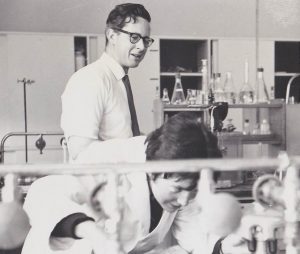
When did you realise that immunology could be a powerful tool in the treatment of cancer?
The idea of using antibodies to attack cancer cells was attractive as it re-directs the bodyŌĆÖs natural way of attacking foreign invaders towards cancer cells. We worked first on the major receptor of leukaemic B lymphocytes, a protein that plays an essential role in the bodyŌĆÖs immune system and which is leukaemia-specific. We developed an antibody against it, showing we could kill leukaemic cells both in the laboratory and in patients. This was one of the first studies showing that antibodies could kill cancer cells in the clinic and was a major breakthrough in cancer research.
ęWe now have many cancers being treated by a range of powerful antibodies and Southampton remains a major centre for developing and optimising this approach.ė
What have been your biggest ŌĆśeurek aŌĆÖ moments in this field?
There are many but three stand out:
- Showing that an antibody can kill tumour cells in patients. One good example of this is the antibody, anti-CD38, which recognises cells of multiple myeloma (a type of bone marrow cancer). Following analysis of its efficacy in our laboratory, it was found to have a dramatic clinical effect in patient trials.┬Ā The antibody, now named daratumumab, was subsequently approved by the USA FDA in 2015, with positive response rates of over 30 per cent reported in patients who had failed all other treatments.┬Ā Even more amazingly, daratumumab is now showing over 80 per cent response rates when given in combination with other drugs, which is unprecedented in this difficult-to-treat cancer. ┬ĀThe result of our research is that anti-CD38 is now becoming standard care for patients with myeloma.
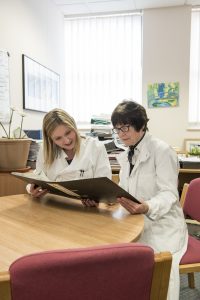
- Designing and testing a DNA fusion gene vaccine which will increase patient immunity against a range of cancers.┬Ā Put simply, a vaccine is delivered to a patient as DNA, meaning the patientŌĆÖs immune system ŌĆ£readsŌĆØ the gene code for the injected ŌĆśharmlessŌĆÖ cancer protein and then makes the self-vaccinating protein in the injected muscle. The approach is now applicable to a wide range of cancers and pilot trials in prostate and colorectal cancer, under the direction of the University of SouthamptonŌĆÖs Professor Christian Ottensmeier, have already proved its efficacy.
ęOur strategy is to ŌĆ£wake upŌĆØ the immune system and this is working very well.ė
- Finding a gene-based way of subdividing the most common leukaemia into two subsets, allowing clinicians to inform patients whether the leukaemia is likely to progress or not. The distinction is made by a simple test which determines the status of the immunoglobulin receptor on the cancer cell surface. ┬ĀIt is now in routine use and has had a massive impact on cancer treatment, allowing therapy to be tailored to the patientŌĆÖs needs.
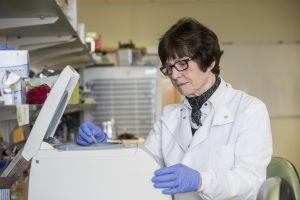
When you first realised the potential of immunology, where did you imagine this route of research would lead in your lifetime?
My first goal as a scientist is to understand how the immune system operates and how it can be mobilised against cancer.┬Ā I hoped for clinical application, ie patient treatments.
Luckily, it has proved to be something we are particularly good at here at Southampton. I have been fortunate to see much of the laboratory research, that I have led, directly translated into patient clinical trials, often with positive outcomes for both participating patients and the development of standard care cancer treatments.
ęAt Southampton, we have great contact with clinicians and are able to apply our laboratory discoveries directly into patient clinical trials.ė
How has Southampton been instrumental in developing immunotherapy treatments for cancer patients?
From small beginnings, Southampton is now a recognised national and international leader in the large and expanding field of immunotherapy for cancer. Martin Glennie, Professor of Immunochemistry and Head of the Antibody and Vaccine Group at the University of Southampton, has continued to develop and apply antibody therapeutics. Christian Ottensmeier, Professor of Experimental Medicine at the University, is the major clinical driver of the vaccination approach with many clinical trials across a wide range of cancer. There are multiple teams engaged in investigating the science behind the immune control of cancer and this will increase with our new Centre for Cancer Immunology.
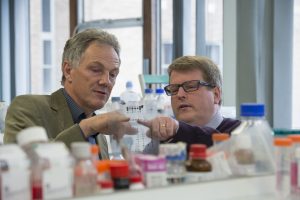
How would you describe the rate of progress in cancer immunotherapy that youŌĆÖve actually witnessed?
Not linear.┬Ā It took time to convince pharmaceutical companies that antibodies were ŌĆ£drugsŌĆØ.┬Ā They are not only directly killing cancer cells but have found a new and unanticipated place in therapy by unlocking natural immunity against cancer. ┬ĀVaccination was even harder and, in the time of ŌĆ£blockbuster drugsŌĆØ, precision vaccines, which can vary from patient to patient, were resisted for many years.┬Ā Their time has now come and Southampton is at the forefront of this.
What would you say is your proudest career achievement?
I was delighted to receive the Jean Bernard Lifetime Achievement Award from the European Haematology Association in 2014 and the Rai-Binet medal for research into chronic lymphocytic leukaemia in 2015.┬Ā In both cases I was the first woman, first non-clinical scientist and first UK citizen to be recognised.
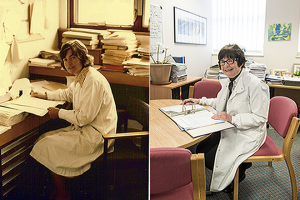
Why did you stay at Southampton?
The University of Southampton has grown to be a leader in the field of cancer immunology research and I have been able to grow alongside this. Southampton is also an optimal size for teams to work together, across the University and its different faculties, as well as across the hospital and the clinical teams.
In addition to the above, staying in Southampton also allowed me to meet the needs of my family and help with the pressures of being a working mother.
What is your current research focus?
Although officially partly retired, I am working with the current teams in Cancer Sciences to try to develop our understanding of a different lymphocytic tumour, follicular lymphoma. We have found some interesting and original features in this tumour which are telling us about how it develops and may reveal new treatment strategies.
ęThe link between the laboratory and clinic has always been a challenge but at Southampton it operates extremely well .ė
What role do you see the new Centre as having in the development of effective cancer treatments?
Establishing the Centre for Cancer Immunology in Southampton shows great foresight, since manipulating the immune system against cancer has moved into the clinic with very exciting results.┬Ā Much remains to be done to understand and optimise the pathways involved and the new Centre will include not only our own highly skilled staff but also additional experts who will bring several new technologies essential for the next stages of investigation.
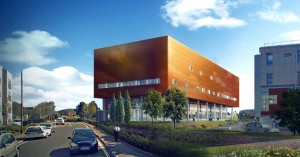
What excites you most about the future of cancer immunotherapy?
There have been innovative discoveries in Southampton which have led to many successful clinical applications, recognised by the international community. Now we have a larger group of clinicians, clinician/scientists and basic scientists working together, with access to new technological developments, progress is accelerating. The goal is to use the powerful immune system to control cancer and this should achieve targeted, more tolerable and cost-effective treatments for cancer and ultimately save more lives.
ęWith the new Centre, our progress will accelerate much more rapidly and will result in many more patient treatments.ė